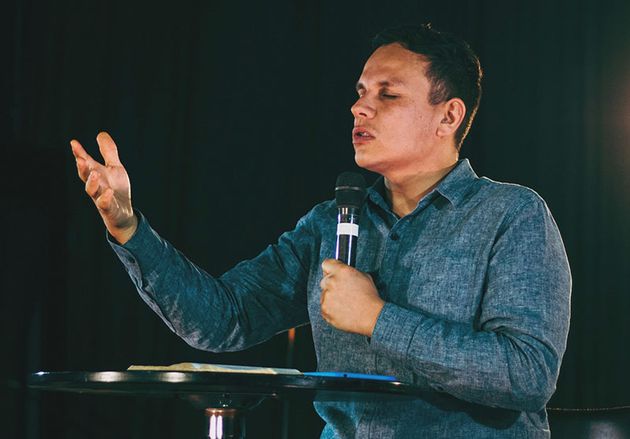Re-Forma’s response to the crisis of poorly-equipped church leadership. An article by Manfred Waldemar Kohl.
![Photo via [link]Lausanne Movement[/link].](https://cms.evangelicalfocus.com/upload/imagenes/61d8282fa299c_standard940Cropped.jpg) Photo via [link]Lausanne Movement[/link].
Photo via [link]Lausanne Movement[/link].
The biggest crisis facing the evangelical global church today is the fact that most pastors, missionaries, and lay leaders have no formal and often inadequate theological training.
A renowned and well-established research institution stated recently that approximately only five percent of all pastors/priests in all the Christian traditions worldwide have formal theological training with an officially recognized theological degree. 1
Far more than 90% of all pastors have only received some kind of informal or non-formal 2 theological education. Many receive no training at all.
There are Bible colleges, mission schools, leadership training programs, internet courses, and international pastoral training institutes in almost every country. A study in the Philippines lists more than 370 officially established training programs. However, there are hundreds more. 3
Every mission agency or Christian organization has its own training program and so do most of the megachurches. The number of these training programs increases daily. I estimate that globally there are least 40,000 informal or non-formal theological training programs.
In some cases, theological seminaries with formal theological programs have been asked to help with informal and non–formal training programs.4
Several excellent informal theological training programs for pastors exist; these are known as ‘Pastor Training Pastors’, an initiative started by RREACH. This organization held a global proclamation congress for ‘Pastor Leaders’ in Thailand. 5
GACX, a global alliance of church multiplicators comprised of 100 church planning mission agencies, predicts a global growth of several million new churches within the next decade. 6
Again, hundreds of thousands of new pastors/leaders are needed. Established seminaries 7 can never fill that need and thousands of additional informal theological training initiatives need to be created.
Whereas formal theological education has a clearly defined program, curriculum, exams, degrees, and associated accreditation processes, the thousands of informal programs have nothing similar; there are no guidelines, no standards, and no outcomes that could be globally accepted and recognized.
Each one does what it considers best. Quite often, the concepts and beliefs of the founders or leaders of each denomination or mission agency determine how the various training programs are carried out.
One teacher and missionary leader stated publicly that he had personally trained more than 15,000 pastors for ministry; each pastor received about six weeks of training and then the missionary leader ordained them as pastors.
He and his board believe that such training is sufficient. There are countless such examples around the world. We would all be better off if all the informal training programs for evangelical church leaders had clear, globally recognized guidelines or standards, focused on biblically-based outcomes.
As Vice-President of Overseas Council International, with the responsibility of assisting theological institutions in the non-Western world, I had the privilege of visiting and working with nearly 500 institutions, both formal and informal.
Some are very effective, but some are not. But when I was confronted with the fact that over 90 percent of all pastors (most likely also Bible teachers, missionaries, and other Christian workers) have not been trained in a formal theological institution,
I felt an incredible burden. I discovered that the single biggest dilemma in Christianity today is the problem of poorly trained or completely untrained pastors and leaders.
We cannot solve this problem by multiplying the capacity of formal theological education tenfold. That would not be feasible as most Christian leaders in the majority world lack the time or resources to devote two or three years to study.
Rather, establishing specific, meaningful guidelines or standards for people in ministry—an essential baseline for everyone involved in Christian leadership—seems to be the best answer.
It does not matter whether someone has attended a mission school or Bible institute for three years, done coursework online, or completed an intensive program of self–study.
What matters is the outcome—whether the person has achieved baseline standards of preparedness for biblical ministry. Such internationally recognized, outcome-based standards, which can be applied to Christian leaders without formal theological training, have never existed.
To fill this gap, in 2016 I founded Re-Forma. I started by calling together a group of experts in the training of pastors and church leaders from around the world.
Our main purpose was to establish a succinct, easily understood set of ministry standards that could be applied to Christian leaders globally. Re-Forma became legally registered in Germany in 2019, and then in South Africa in 2020.
We plan to achieve registration in North America, Asia, and Latin America over the next three years. Dr Reuben van Rensburg serves as Re-Forma’s full-time Project Director, with additional staff at several locations. 8

Re-Forma exists for the following reasons:
To establish guidelines and globally recognized standards, based on outcomes, for all biblical ministries.
To help and encourage existing global and local training programs that are not part of formal training institutions, by providing a list of needed areas of instruction and outcomes.
To provide any person who can demonstrate the required outcomes with a Re-Forma Certificate of Biblical Training for Ministry, which is underwritten by the World Evangelical Alliance.
To provide the same Re-Forma biblical ministry guidelines and outcomes that could be used for new believers, new churches, and especially for any new training programs.
To enhance the effectiveness and reach of the many existing training institutions and programs, as well as the quality of networking amongst them.
For Re-Forma, the key issue is that every pastor or church leader should have a solid biblically-derived knowledge base that is applicable to every main aspect of Christian ministry.
Re-Forma has established 35 basic outcomes that every person in Christian ministry should master. These outcomes are simple and easily measurable. A Bible college, mission school, or internet-based program can apply these outcomes as part of their curriculum or teaching material.
Even individuals can learn these outcomes on their own. These outcomes can easily be transferred to an orality culture and its people.
The best analogy to the Re-Forma approach is to consider what happens when someone wants to obtain an official driver’s license. Applicants are not asked what training school they attended, who taught them, or how much time they spent learning to drive.
Rather, they are given a test (typically including both written and actual driving components). The underlying question is ‘Show me that you can drive properly and that you meet all the important traffic requirements.’
Re-Forma is taking the same approach by asking 35 key questions to determine whether a person knows how to do biblically-based Christian ministry.
Every candidate who applies for a Re-Forma certificate is tested by a trained, local facilitator. Re-Forma brings the facilitators together in various countries or regions to train them to assess groups of students against the Re-Forma outcomes.
Quite often, the leader or Principal of a training program also serves as the facilitator. These trainers are already familiar with the Re-Forma guidelines and, in some cases, are building their instructional programs around those guidelines/outcomes/standards.
The 35 outcomes are divided into five categories essential for ministry. They cover all theoretical and practical aspects a pastor needs today. The categories are:
Knowing The Scriptures—usually called Biblical Theology, Old Testament and New Testament Surveys.
Living by Faith—usually called Practical Theology, Hermeneutics, Children’s Ministry, Church Management, Relationships.
Outreach—usually called Evangelism, Missions, Discipling.
Listening and Encouraging—usually called Counselling, Family.
Trustworthy Faith—usually called Systematic Theology, Ethics, Church History, Stewardship.
Each category has seven specific outcomes. All the 35 outcomes are explained in detail on the website, with additional material and commentary.
It also offers materials and guidelines for pastors and church leaders in the Global South who have a newly established training program or plan to establish one.9

Over 1,000 different groups (colleges, Bible schools, mission training institutions, church leadership programs) are already participating in the Re-Forma program.
The 35 standards are seen as helpful guidelines being used by the various denominational groups as well as local independent or international training programs.
For the vast growing church in the Global South, Re-Forma is helping to provide trained biblical leadership. These outcome-based standards are being used by countless pastors who have finished their theological training years ago but never had time for further studies. It is a helpful ministry refresher course for continuing education.10
Re-Forma has received much positive feedback from students who have graduated and confirmed that being successfully able to meet the 35 outcomes has transformed their ministry.
As with all programs, it is necessary to evaluate and to make any adjustments that are appropriate, but the current results indicate that the outcomes are meeting a great need in the non-formal and informal sector of ministry training.
We hope organizations and institutions globally are able to learn from the concept and the model presented so that many more leaders are effectively equipped for ministry.
Dr Manfred Waldemar Kohl lives in Nova Scotia, Canada. He has been with the Lausanne Movement from the beginning, attending every conference. He serves as Co-Catalyst for the Integrity and Anti-Corruption Network.
Five years ago, he founded Re-Forma, an organization that established standards and outcomes/guidelines for training pastors/leaders within global non-formal or informal theological training institutions.
This article originally appeared in the November 2021 issue of the Lausanne Global Analysis and is published here with permission. To receive this free bimonthly publication from the Lausanne Movement, subscribe online at www.lausanne.org/analysis.
1. These numbers came from a presentation by Dr Ramesh Richard at the GProCongress in Bangkok Thailand in 2016. He referred to the research done by The Center for the Study of Global Christianity, located at the Gordon Conwell Theological Seminary in Wenham, MA
2. In non-formal training, students study at institutions, Bible colleges, and church-based programs, which do not offer accredited, formal programs. Informal training takes place by observing, practicing, internships, etc.
3. Manfred Waldemar Kohl, The Church in the Philippines-A Research Project with Special Emphasis on Theological Education (Manilla, Philippines: OMF Literature Press, 2005) 22-31.
4. As an example, the Formal Evangelical Theological Seminary BEST in Bangui Central Africa regularly invited the leaders and teachers of Bible schools and other ministry training programs in the country, for a week of lectures, as well as mentoring, advising, and helping. The entire faculty of BEST is involved in this program on a regular basis. This project is encouraged and partially funded by organizations like Overseas Council International and others.
5. The GProCongress took place at Bangkok Thailand in 2016, with an excellent follow-up program by RREACH (Ramesh Richard Evangelish and Church Health), led by Dr Ramesh Richard, Dallas, Texas. TOPIC (Training of Pastors International Coalition) is an organization that works in conjunction with RREACH. The Global facilitator of TOPIC is Pastor Al Bridges. See also the article by Dr Ramesh Richard at.
6. More information about GACX can be found at . See its Vision in Action at
7. Editor’s Note: See article by Brian E. Woolnough entitled, ‘Rethinking Seminary Education’ in September 2019 issue of Lausanne Global Analysis
8. List of all the staff, board, and advisory council is available on the Re-Forma website.
9. Re-Forma material has already been translated into 20 languages. Re-Forma plans to identify local representatives in most areas of the world. The leadership of Re-Forma (board, staff, and advisory council) comprises more than 40 theologians and church leaders from around the world.
10.For individuals who are not involved in an established program, Re-Forma also has a specially designed online program.

Las opiniones vertidas por nuestros colaboradores se realizan a nivel personal, pudiendo coincidir o no con la postura de la dirección de Protestante Digital.
Si quieres comentar o